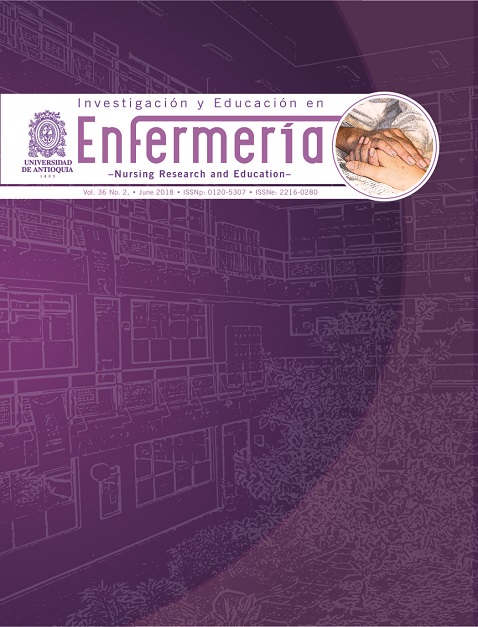Communities of practice: influences on pedagogical reasoning and action of nursing professors
DOI:
https://doi.org/10.17533/udea.iee.v36n2e02Keywords:
Higher education, learning, schools, nursing, teacher training, faculty, nursing.Abstract
Objective. To analyze how the practice shared in communities of teaching practice in public and private universities influences the pedagogical reasoning and action of nursing professors based on Wenger’s concepts of community, negotiation of meaning, and learning.
Methods. Case study conducted with two professors teaching nursing in a public and a private university in Brazil. Data collection included triangulation of sources and was conducted from April 2014 to July 2015. Data were organized in ATLAS.ti and analyzed using the constant comparative method, which generated three meta-categories.
Results. In both cases the program’s project is shared repertoire and grounds negotiation of meaning in the practice that takes place in the pedagogical reasoning and action phases but negotiation is different between communities and cases. Learning is either solitary or has the influence of at least one other member but does not occur on an institutional basis.
Conclusion. Nursing schools could offer more than program’s project to the negotiation of meaning and improve learning on practice in their communities as police of teachers education to improve pedagogical reasoning.
How to cite this article: Menegaz JC, Backes VMS, Medina JL. Communities of practice: influences on pedagogical reasoning and action of nursing professors. Invest. Educ. Enferm. 2018; 36(2):e02.
Downloads
References
(1) National Institute of Estudies and Educational Research Anísio Teixeira. Census of Higher Education [Internet]. 2013 [cited 22 Feb 2016]. Available from: http://portal.inep.gov.br/web/censo-da-educacao-superior/resumos-tecnicos
(2) Campos SRM, Henriques R, Yanaze MH. Governance of Higher Education Institutions in Brazil: An Exploratory Study Based on Supply and Demand Conditions. In: ditors: Rocha Á, Correia, AM, Adeli H, Reis LP, Teixeira M M. New Advances in Information Systems and Technologies 444. Switzerland: Springer International Publishing; 2016. P: 25–38.
(3) Brazil Ministério da Educação. Instituições de Educação Superior e Cursos Cadastrados [Internet]. 2016 [cited 22 Feb 2016]. Available from: http://emec.mec.gov.br/
(4) Shulman LS. Knowledge and teaching: foundations of the new reform. Harvard Educ. Rev. 1987; 57(1):1-22.
(5) Endacott JL, Sturtz J. Historical empathy and pedagogical reasoning. J. Soc. Stud. Res. 2012; 39(2): 1–16.
(6) Wenger E. Communities of practice: learning, and identify. 1st ed. Madrid: Paidós; 2011.
(7) Seibert S. The Meaning of a Healthcare Community of Practice. Nurs. Forum. 2015; 50(2):69-74.
(8) Probst G, Borzillo S. Why communities of practice succeed and why they fail. Eur. Manag. J. 2008; 26(5):335–47.
(9) Mayer A, Woulfin S, Warhol L. Moving the center of expertise: Applying communities of practice framework to understand coaching in urban school reform. J. Educ. Change. 2015; 16(1):101–23.
(10) Stake RE. The Art of Case Study Research. 4th ed. Washington (DC): Sage Publications; 2007.
(11) Baxter P, Jack S. Qualitative Case Study Methodology: Study Design and Implementation for Novice Researchers. Qual. Rep. 2008; 13(4): 544-59.
(12) Strauss A, Corbin JM. Basics of qualitative research: Grounded theory procedures and techniques. Thousand Oaks, CA, US: Sage Publications, Inc; 1990.
(13) Backes VMS. Medina JL, Prado ML, Menegaz JC, Cunha AP, Francisco BS. Expressions of pedagogical content knowledge of an experienced nursing teacher. Texto Contexto – Enferm. 2013; 22(3):804-10.
(14) Silveira Z, Bianchetti L. Modern University: from the interests of the nation-state to market advantages. Bras. J. Educ. 2016; 21(64):79–99.
(15) Silva JR, Ferreira LR, Kato FBG. The work of research professors in the face of the expansion of graduate education after LDB. Rev. Bras. Educ. 2013; 18(53):435-56.
(16) Jiwa M, Chan W, Ross J, Shaw T, Magin PJ. Communities of practice: quality improvement or research in general practice. Aust. Fam. Physician. 2011; 40(1):72-5.
(17) Andrew N, Tolson D, Ferguson D. Building on Wenger: Communities of practice in nursing. Nurs. Educ. Today. 2008; 28(2):246–52.
(18) Tanji S, Vianna LO. Continuing education subsidizing the competence of teachers of graduate nursing course. J. Nurs. UFPE. 2012; 6(9):2065-70.
(19) Horn IS. Teachers Learning Together: Pedagogical Reasoning in Mathematics Teachers’ Collaborative Conversations. In: Cho S, Editor. Selected Regular Lectures from the 12th International Congress on Mathematical Education. Switzerland: Springer International Publishing; 2015. P:333–42.
(20) Andrew N, Ferguson D, Wilkie G, Corcoran T, Simpson L. Developing professional identity in nursing academics: the role of communities of practice. Nurs. Educ.Today 2009; 29(6):607-11.
Downloads
Published
How to Cite
Issue
Section
License
Derechos de propiedad / Direitos de Propriedade
English: If the article is accepted for publication, all copyright will be of exclusive property of Investigación y Educación en Enfermería. The text and the graphics included in the publication are exclusive responsibility of the authors and not necessarily reflect the thought of the Editorial Committee.
Español: Si el artículo es aprobado para publicación, todos los derechos son de propiedad de Investigación y Educación en Enfermería. El texto y las gráficas incluidas en la publicación son de exclusiva responsabilidad de los autores y no necesariamente refleja el pensamiento del Comité Editorial.
Português: Se o artigo for aceito para publicação, todos os direitos autorais serão de propriedade exclusiva de Investigación y Educación en Enfermería. O texto e os gráficos incluídos na publicação são de responsabilidade exclusiva dos autores e não refletem necessariamente o pensamento do Comitê Editorial.















